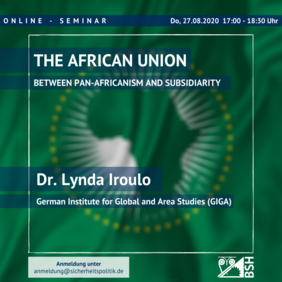Dr. Iroulo stated that the major reason for the foundation of the predecessor of the African Union, the Organization for African Unity, was an internal awakening by external exposure. Many veterans of World War II returned home to the continent after the war with a new realization of their equality. Others who studied abroad brought with them the ideas of Pan-Africanism, freedom for Africans everywhere and the termination of colonialism as well as apartheid.
The African Union and its structure might have been too vast to be explained in one session, yet, Dr. Iroulo provided our participants with a brief overview. Afterwards, she explained the African Peace and Security Structure. Its main task is to tackle ongoing conflicts on the African continent. However, it is strongly constrained by legal issues and resources at its disposal. The Peace & Security Council is a major pillar of the African Peace and Security Architecture. The Peace & Security Council consists of 15 members elected for either three or two years. The 15 seats are distributed among the regions west, north, east, south and central with regards to size and continuity. It has subsidiary bodies like the Military Staff, Committee of Experts, and High-Level Panel to advise it. The council cooperates with many regional and international institutions and actors.
It is difficult to rate the effectiveness of the AU and its institutions properly, however, Dr. Iroulo identified strengths and weaknesses. The AU stands for collectivity, solidarity and decision-making through consensus. It enables the African states to have a single voice in global politics and actively push for more funding for UN-Peace missions in Africa. Domestically, the AU regulates its member-state’s behavior and has facilitated many groundbreaking treaties and helped to set norms.
However, according to Dr. Iroulo, it is a major weakness of the organization that it is “a saying, not a doing” organization. The people of Africa are not at the heart of the organization and there is a lack of accountability. The biggest weakness and challenge is a huge dependency on external help. Around 90% of the AU’s Peace and Security budget consists of foreign funding.
Lastly, Dr. Iroulo described specific areas in which the AU excels. One of them is the Rule of Law. Furthermore, the Union contributed much to global politics. 90% of natural resources are found in Africa. These resources have played a crucial role in every developed nation and continues to be a source of attraction to Africa. Dr. Iroulo is convinced that many international organizations, especially the United Nations, can learn from the AU institutional designs and its approach to a fair and just representation of its member states.
Lastly, we opened the floor for questions. Our participants were eager to know more about the African Union as an institution, its role in global politics, future projects and developments as well as its relations to the People’s Republic of China.
We thank Dr. Lynda Iroulo for her time and effort to further our understanding of the African Union and the African Peace and Security Architecture. Our next online seminar is going to take place on the 10th of September, from 17:00 to 18:30. Dr. Christina Kohler is going to give a talk about climate change and security risks.

